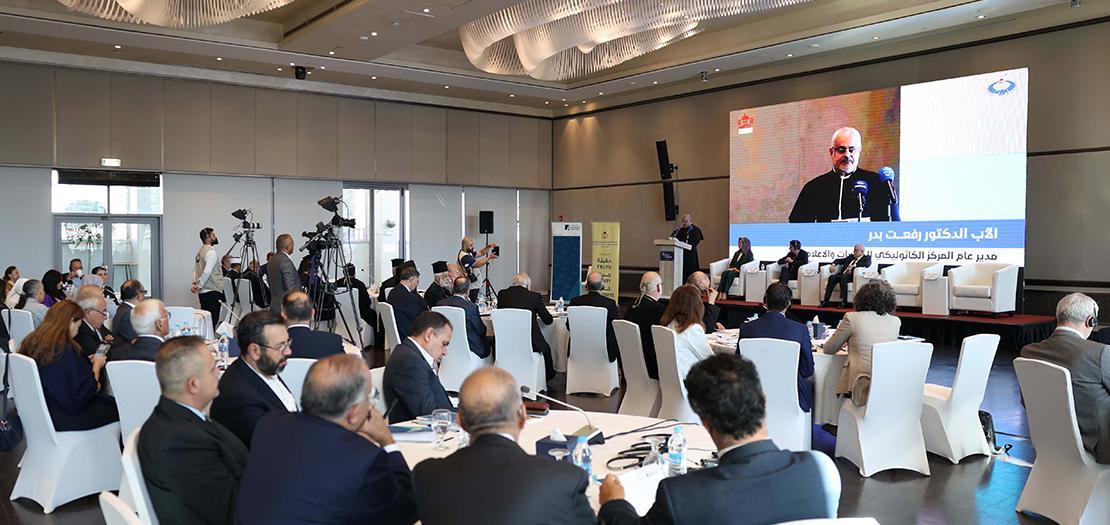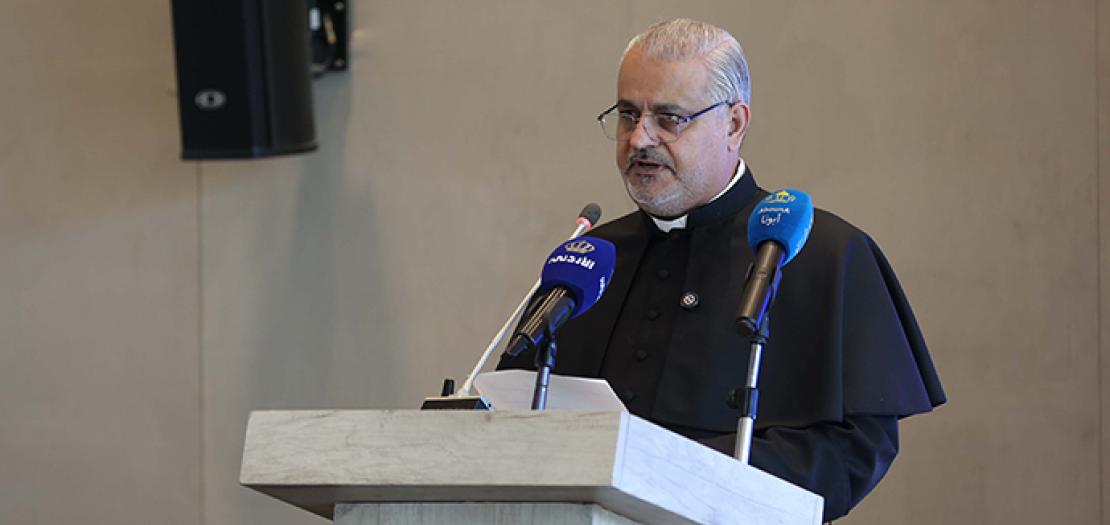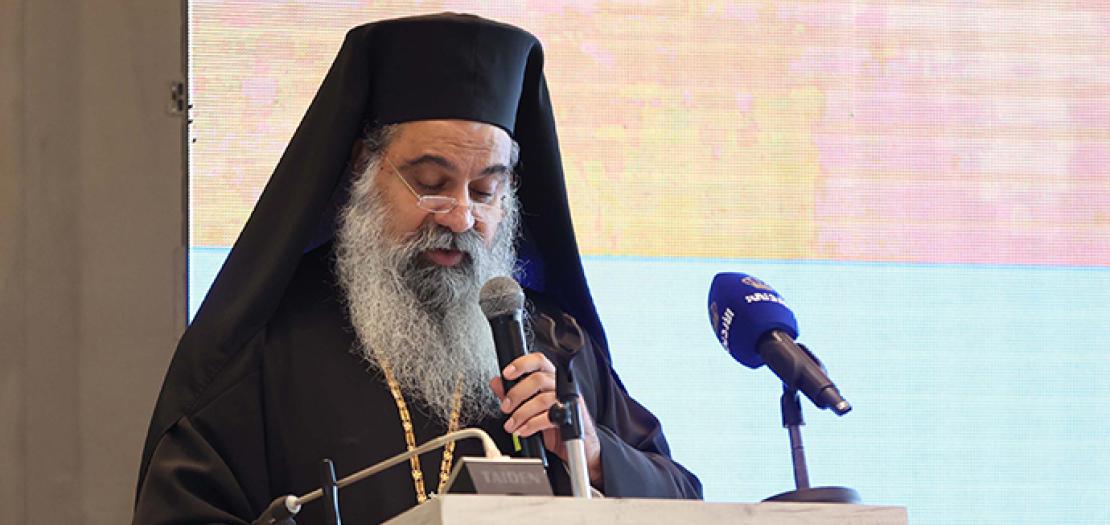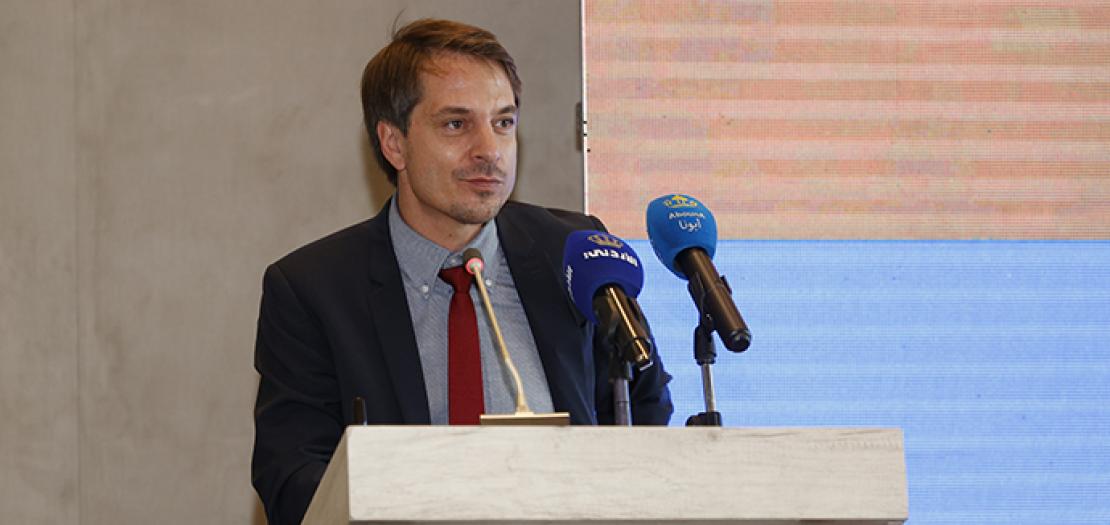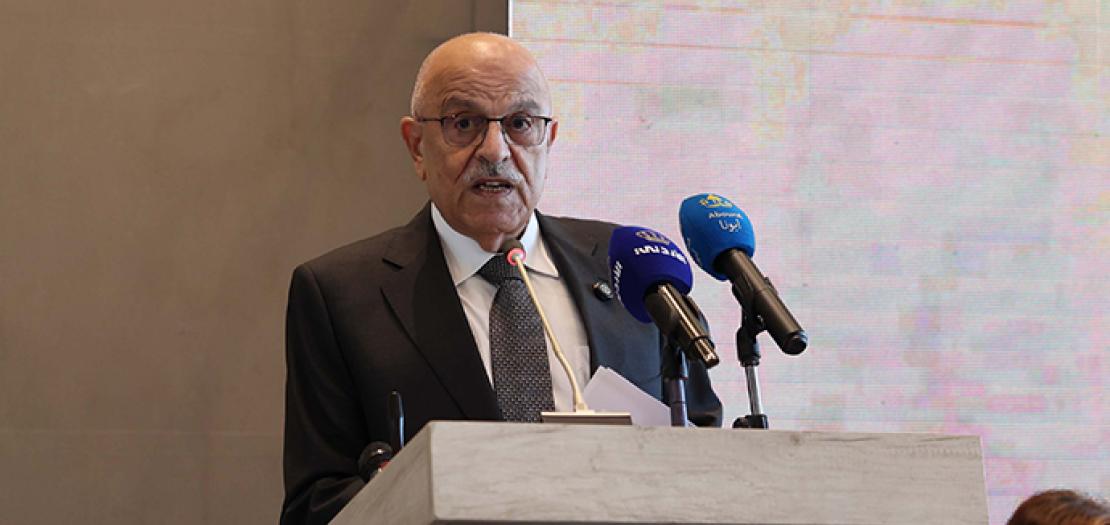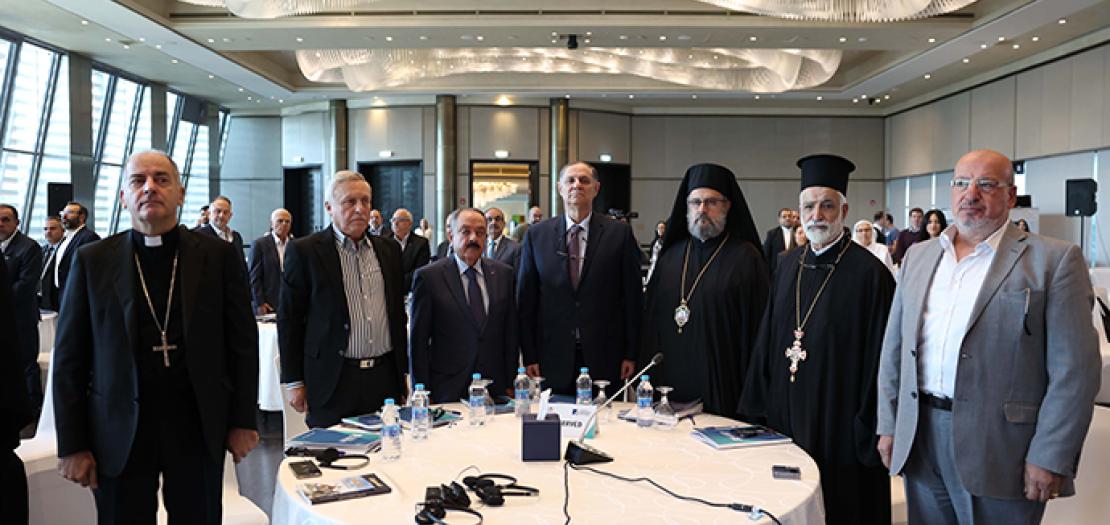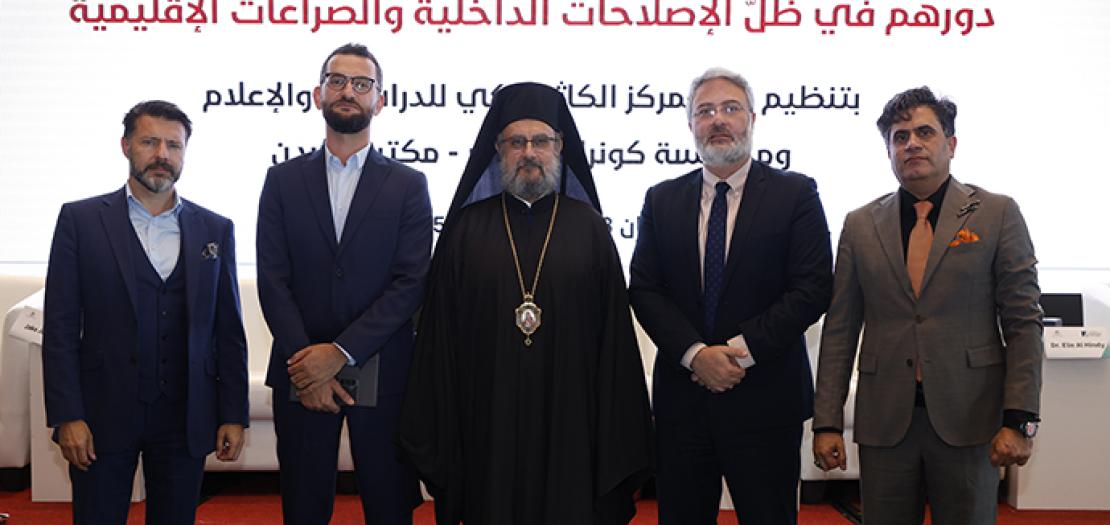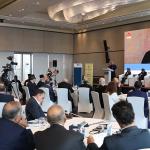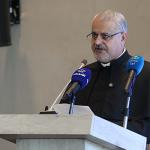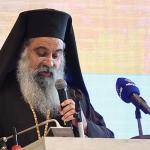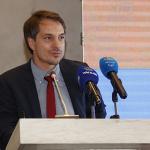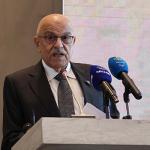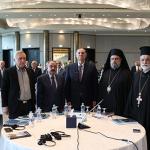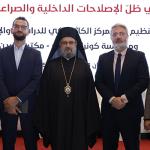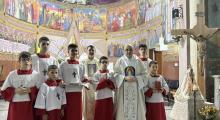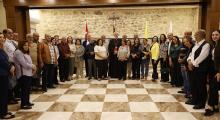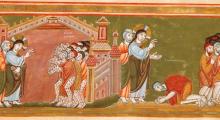Issued by the Catholic Center for Studies and Media - Jordan. Editor-in-chief Fr. Rif'at Bader - موقع أبونا abouna.org
Under the patronage of His Excellency Dr. Rajai Muasher, former deputy prime minister, the Catholic Center for Studies and Media (CCSM) in Jordan, in cooperation with Konrad Adenauer Stiftung, held on Monday, October 13, an international conference titled, "Christians in Jordan and the Middle East: Defining a Role Amidst Domestic Reforms and Regional Conflicts."
At the opening ceremony, moderated by Dr. Hiba Abbasi, CCSM Director Fr. Dr. Rif'at Bader, delivered an address in which he noted that this meeting complements a series of conferences and initiatives that started in cooperation with Konrad Adenauer Stiftung in 2015 in Como, Italy, on Arab Christianity, and then extended to Berlin in 2016 discussing what Christians expect from the Western world, and then in Amman in 2023 on the reality and future of Christians in the East.
Fr.Bader welcomed the attendees and the conference sponsor, His Excellency Dr. Rajai Muasher, noting that his selection to sponsor this event and its theme was not a coincidence as he is one of the most prominent national and Christian figures in Jordan, who embodies the balance between national affiliation and loyalty to the wise Hashemite leadership.
He pointed out that the conference aims to highlight the success of the Jordanian experience in respecting all religious components, and emphasizes that the Christian presence in the Jordanian society is an honorable, pioneering, remarkable, effective, vibrant, and fruitful in various political, economic, social, cultural, and religious fields. He added that the conference also seeks to encourage our brethren in Syria and Iraq to resort to religion so as to remain a factor of love and peace, rather than a factor of schism and conflict.
Concluding his address, Fr. Bader stressed the importance of continuing peace efforts with the Gaza agreement serving as a step toward a lasting, comprehensive, and just peace especially for the Palestinian people who yearn for freedom and independence. In this context, he lauded the role played by His Majesty King Abdullah II Ibn Al- Hussein and His Royal Highness Crown Prince Al-Hussein Ibn Abdullah II, as well as all those who contribute to building peace in Palestine and the world.
For his part, Dr. Edmund Ratka, resident representative of the Konrad Adenauer Stiftung in Jordan, said he is proud that this gathering was his last major activity he contributed to during the five years he spent in Jordan. He pointed out that the conference touches on one of Konrad Adenauer Stiftung's main topics represented in enhancing dialogue and building bridges, especially at times marked by uncertainty.
He added that Konrad Adenauer Stiftung seeks to enroot bridges of understanding in a world that witnesses increased division, polarization, and a malfunctioning international order as evidenced by the recent events in Gaza. In this context, he praised the role played by His Majesty King Abdullah II, describing him as a voice of peace in the region and the world.
He also emphasized the important role played by Christians at the local and international levels, noting that Christian Arab s have made significant contributions to serving humanity. He expressed his hope that this conference would contribute to providing a constructive vision and approach in the face of the challenges facing the Middle East and the Levant in particular.
In an address delivered by Archimandrite Venedictus Kayyal--on behalf of His Eminence Archbishop Christoforos Atallah, leader of the Orthodox Church in Jordan-- he noted that the conference is being held at a time of transformation and reform, during which the region's societies seek to entrench their understanding of true citizenship. He emphasized that the Christian presence in the Middle East is vibrant, while called upon to contribute to nation-building and to serving the common good.
He noted that the Christian faith calls on members of the Church to participate positively in public life, while being enlightened by the values of justice, equality, and love. He underlined the importance of promoting education, equal opportunities, and participation in civic life in their capacity as basic pillars that enable societies to fulfill their faith and humanitarian mission.
He also called for consolidating ties among Christians in the Middle East and their brethren around the world, as well as building bridges that enhance solidarity and peace. He stressed that regional and international Christian networks are valuable tools for promoting dialogue and common living.
The first session was titled, "Christians in Jordan: A Model for Coexistence, National Unity, and Conclusive Citizenship", during which patron of the conference His Excellency Dr. Rajai Muasher delivered an address during which he touched on Jordan's distinguished experience in respecting all religious components and their role in strengthening national unity. Further addresses were made by Christine Faddoul, judge of appeal at the Greek Orthodox Ecclesiastical Court in Amman; and Oraib Rantawi, founder and director of Al-Quds Center for Political Studies, while the session was moderated by journalist Rana Sweis.
Dr. Muasher underlined the importance of evoking Christian Arab history to understand the depth of national commitment, enroot Christian unity, and clarify the concept of good citizenship. He noted that Christian Arabs participated effectively in three major roles, namely represented in contributing to the establishment of the Arab and Islamic state and human civilization; defending Arab and Islamic presence against foreign invasions; and participating in the modern Arab continued that the fate of Christian Arabs is associated with the fate of Muslim Arabs within the framework of inclusive Arabism, which constitutes the shared historical, social, and civilization crucible for both parties.
He pointed out that the national responsibility of Christian Arabs lies in activating the Islamic-Christian partnership through holding internal dialogue, striving to put the extended Arab house in order, and expanding the scope of this dialogue to reach various segments of society. He also called for resuscitating the national enlightenment heritage where the Arab intellectuals particularly Christians, who studied and defended Islam in the context of the modern Arab renaissance contributed to its formulation. He also emphasized that this historic partnership will continue to be the cornerstone of preserving the unity and cohesion of Arab societies.
He added that Christian Jordanians cherish the spirit upon which the Jordanian state was founded as they adhere to the values and principles upon which the Kingdom was founded, while considering this spirit to be the source of the nation's strength and steadfastness.
He praised His Majesty King Abdullah II's vision with regards to consolidating the principles of true citizenship, as outlined in the "Amman Message" and the Royal Discussion Papers which are based on constructive initiative, acceptance of diversity, and respecting opinions of others. He emphasized that Christian Arabs have a political, social, and cultural responsibility designed to strengthening the national fabric in their Arab societies, entrenching the values of participation, affiliation, and cementing unity in the face of the current challenges.
The second session focused on " Between National Aspirations, Confessional Particularities and the Quest for Citizenship—Christians in Syria, Lebanon, and Iraq "with the participation of Bishop Dr. Demetrios Charbak, auxiliary archbishop of Akkar, bishop of Banias in Syria; Director of Adyan Foundation in Syria Roger Asfar; Professor of Political Science at Al-Mustansiriyah University Dr. Saad Salloum; in addition to expert in diversity management and cultural governance in Lebanon and the UAE Dr. Elie Al-Hindy. The session was moderated by Dr. Jake Jones, resident program director of the International Republican Institute in Jordan
The participants in the third session which touched on "Interfaith and International Dialogue: Perceptions Networks, and the Potential of Cooperation" included Apostolic Nuncio to Jordan Archbishop Giovanni Pietro Dal Toso; General Secretary of the Central Committee of German Catholics Marc Frings; and Dr. Jamal Shalabi, professor of political science at the Hashemite University. The session was moderated by Dr. Edmund Ratka.
The conference concluded with a fourth session titled, "Christians in Palestine—Book Review" that touched on discussing a book by Mr. Xavier Abu Eid and titled, Rooted in Palestine: Palestinian Christians and the Struggle for National Liberation (1917-2004)". The commentator was Director General of Community Media network Mr. Daoud Kuttab. It was moderated Simon Engelkes, resident representative of Konrad in Ramallah.


